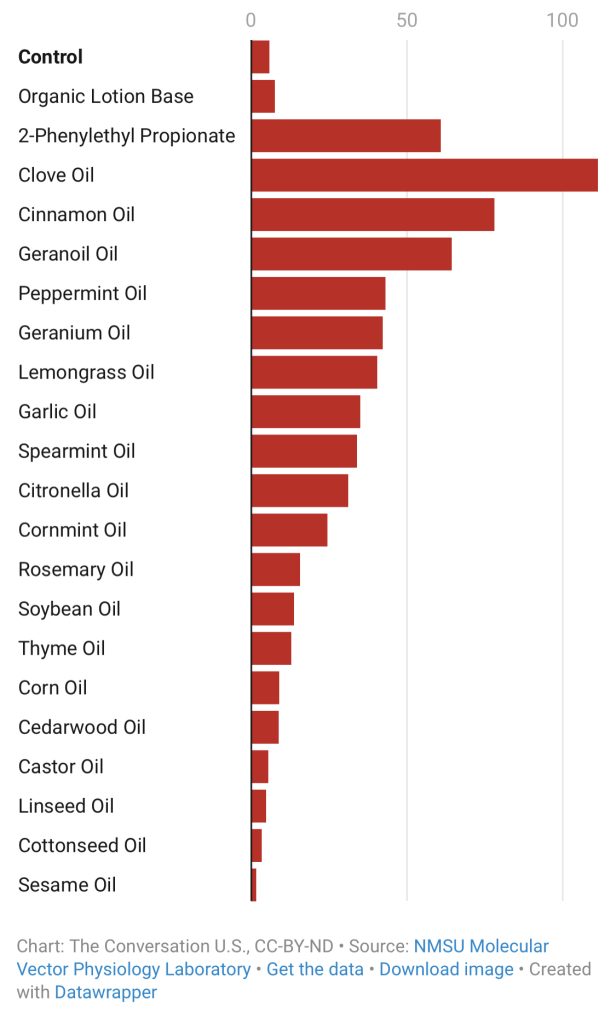


The use of repellents can protect both your health and sanity.
While some bug bites leave bothersome, itchy bumps on your skin they can also pose a serious threat and sometimes deadly risk to your health. Insect-borne diseases, may transmit harmful pathogens that can cause dangerous diseases like Lyme disease, Malaria, Dengue fever, Zika, and West Nile.
Mosquitos can transmit pathogens such as ZIKA, chikungunya, dengue, West Nile, Eastern equine encephalitis and yellow fever viruses and the. malaria parasite. Biting midges (no-see-ums) and some mosquitos can transmit Oropouche virus. Ticks can transmit the bacteria that cause Lyme disease and Rocky Mountain spotted fever, the parasite that causes babesiosis, and viruses such as Powassan virus.
We have options when it comes to choosing what type of repellent to use -- sprays and lotions, candles, coils and vaporizers to name a few.
These repellents interfere with a mosquito's sense of smell, taste or both. The repellent either blocks or over stimulates these senses.
Bracelets, wristbands and watches. Even if they are loaded with repellents, they can't protect your whole body from getting bitten.
Ultrasonic repellent devices don't work. These come as electrical plug-ins, free standing varieties or watch-like accessories that claim to emit a high frequency sound that deters bugs by mimicking bats.
Dietary Supplements -- vitamin B, garlic, and so on -- don't work.
Light based repellents don't work. These devices come as colored light bulbs and they don't attract insects that fly toward white light. This works well on months, beetles, and stinkbugs but not on mosquitos.
DEET works! DEET, was developed in the 1950's by the US Army and is a well established bug repellent. Despite its sixty year history of use by consumers, how exactly DEET works to keep bugs at bay still isn't fully understood. It's likely that more than one mechanism is at play.
How safe is DEET? Since it was originally used in 1957 a broad scientific consensus still holds that the chemical is safe when used as directed on the label. Toxic and allergic reactions have been uncommon.
DEET is highly effective against mosquitos and ticks. It also repels chiggers, fleas, and some flies including biting midges and gnats but NOT Tsetse Flies, which transmit the parasite that causes African trypanosomiasis (sleeping sickness).
DEET is available in concentrations of 5-100%. Higher concentrations typically provide longer-lasting protection, but increasing concentrations above 50% have not shown to improve efficacy. Products contain < 20% DEET provide 1-6 hrs of protection.
Using DEET on children - according to the CDC, DEET can be used on children without age restriction. The American Academy of Pediatrics recommends using DEET sparingly on children < 2 years of age.
Picaridin is effective. Skin So Soft Bug Guard Plus Picaridin, available in a spray and wipes, provides protection against mosquitos, ticks and flies (including biting midges, but NOT Tsetse flies) fleas and chiggers. This synthetic repellent can protect for up to six hours at a 20% concentration. This is a promising alternate to DEET. (Oil free, Dermatologist tested)
Oil of lemon eucalyptus, or OLE, works. OLE, with the active ingredient PMD, is a plant-based alternative to DEET and Picaridin. It's repellent properties can last for up to six hours.
Citronella works, just not that great and for not that long.
Permethrin, is a common insecticide used on pets, there are dog-specific permethrin products available, these products are often formulated as dips, shampoos, or sprays. It's crucial to follow specific product instructions and avoid contact until the application is completely dry. Permethrin is highly effective against fleas, ticks and lice. It is important to note … Permethrin is highly toxic to cats and therefore should be kept away.
Help protect your dog with Insect Shield bug repellent dog blankets, pet clothes, and accessories.
Always consult with your veterinarian to determine the best flea and tick control strategy for your pets, as they can advise on the most appropriate products and methods.
An arm-in-cage experiment for different essential oils has been completed specifically for mosquitos. Complete protection times (in minutes) measured for lotions with a 10% concentration of each essential oil. The longer the complete protection time the better the repellent will protect against mosquitos.
If your planning to mix your own plant-based mosquito repellent, remember that essential oils are complex mixtures of plant-made chemicals that can cause skin irritation.

Based on studies and efficacy we recommend using repellents with the active ingredient DEET that contains at least 20-30 percent DEET on exposed skin and clothing and re-apply as directed. If you are wearing sunscreen and DEET apply sunscreen first.
Sometimes, despite one’s greatest efforts, bug bites still happen. Fortunately, most bug bites and stings can be safely treated at home.
There is also Permethrin treated clothing and camping gear repellent. (Insect Shield)
For painful bites, such as a bee sting, take an over-the-counter painkiller, such as acetaminophen or ibuprofen. For bites that itch, apply an ice pack or an over-the-counter anti-itch cream, such as hydrocortisone. Another option is to take an over-the-counter oral antihistamine. Always follow the directions on the label and use the correct dose. If these over the counter remedies do not work schedule an appointment to discuss treatment options that may yield better relief.
If you experience any serious symptoms after a bug bite, such as a rash, fever, or body aches, schedule an appointment immediately. Make sure you tell us about your recent bite so that we can examine you for a transmitted disease.

